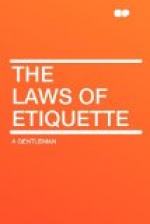Flattery never should be direct. It should not be stated, but inferred. It is better acted than uttered. Flattery should seem to be the unwitting and even unwilling expression of genuine admiration. Some very weak persons do not require that expressions of praise and esteem toward them should be sincere. They are pleased with the incense, although they perceive whence it arises: they are pleased that they are of importance enough to have their favour courted. But in most eases it is necessary that the flattery should appear to be the honest offspring of the feelings. Such flattery must succeed; for, it is founded upon a principle in our nature which is as deep as life; namely, that we always love those who we think love us.
It is sometimes flattery to accept praises.
Never flatter one person in the presence of another.
Never commend a lady’s musical skill to another lady who herself plays.
It has often, however, a good effect to praise one man to his particular friend, if it be for something to which that friend has himself no pretensions.
It is an error to imagine that men are less intoxicated with flattery than women. The only difference is that esteem must be expressed to women, but proved to men.
Flattery is of course efficacious to obtain positive benefits. It is of, more constant use, however, for purposes of defence. You conquer an attack of rudeness by courtesy: you avert an attack of accusation by flattery. Every:one remembers the anecdote of Dr. Johnson and Mr. Ewing. “Prince,” said Napoleon to Talleyrand, “they tell me that you sometimes speculate improperly in the funds. “They do me wrong then,” said Talleyrand. “But how did you acquire so much money!” “I bought stock the day before you were proclaimed First Consul,” replied the ex-bishop, “and I sold it the day after.”
Compliments are light skirmishes in the war of flattery, for the purpose of obtaining an occasional object. They are little false coins that you receive with one hand and pay away with the other. To flatter requires a profound knowledge of human nature and of the character of your subject; to compliment skillfully, it is sufficient that you are a pupil of Spurzheim.
It is a common practice with men to abstain from grave conversation with women. And the habit is in general judicious. If the woman is young, gay and trifling, talk to her only of the latest fashions, the gossip of the day, etc. But this in other cases is not to be done. Most women who are a little old, particularly married women — and even some who are young — wish to obtain a reputation for intellect and an acquaintance With science. You therefore pay them a real compliment, and gratify their self-love, by conversing occasionally upon grave matters, which they do not understand, and do not really relish. You may interrupt a discussion on the beauty of a dahlia, by observing that as you know that they take an interest in such things you mention the discovery of a new method of analyzing curves of double curvature. Men who talk only of trifles will rarely be popular with women past twenty-five.




